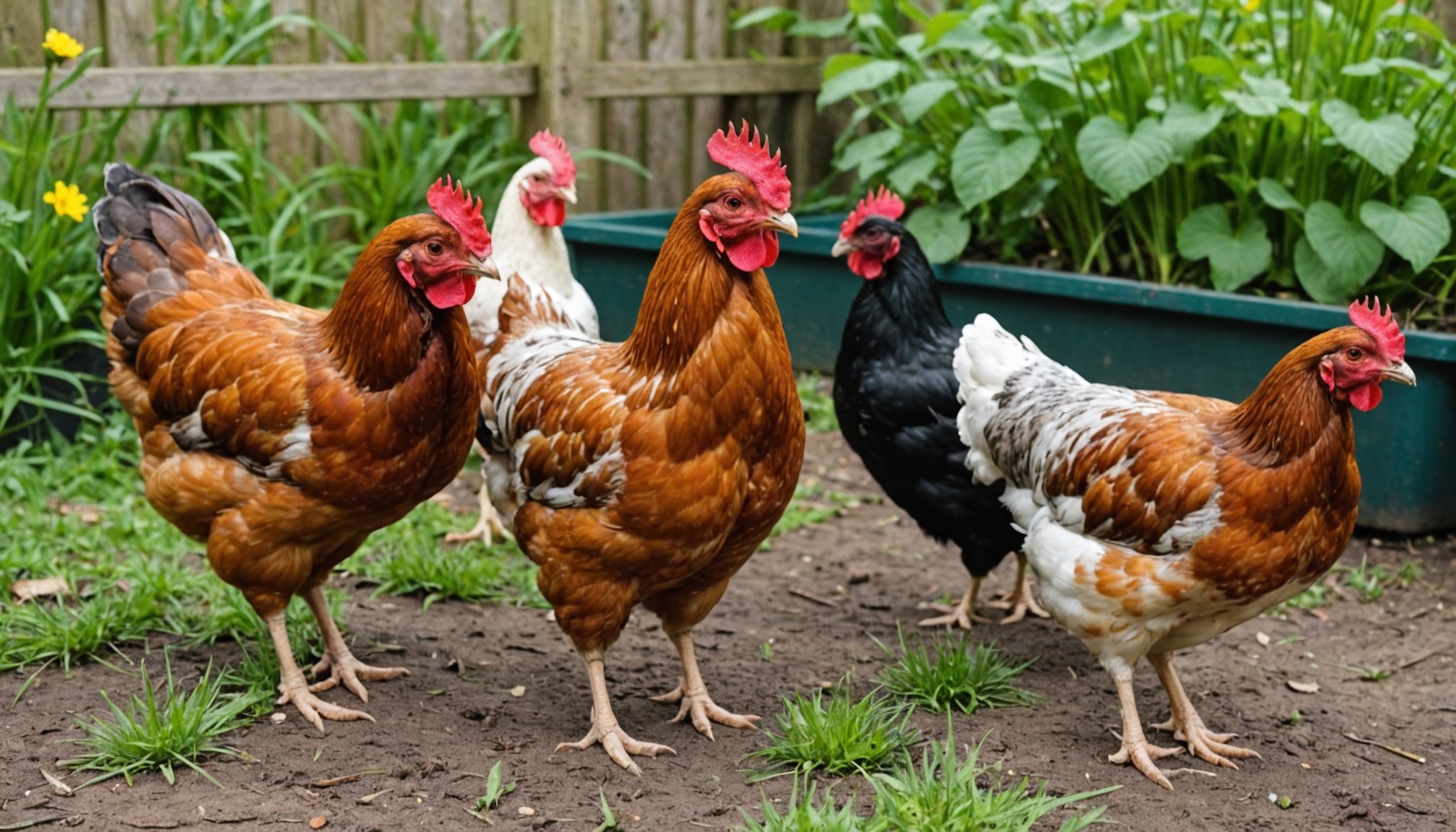Raising chickens in your garden can be a rewarding venture, but the challenge of keeping the peace with your neighbors often looms large. Discover practical tips to ensure your feathered friends thrive without causing a ruckus. From choosing the right breeds to effective noise control and proper coop management, you’ll learn how to make this sustainable hobby enjoyable for everyone. Transform your garden into a tranquil haven while enjoying fresh eggs and an enchanting touch of rural life in the heart of the city.
Understanding Urban Chicken Keeping
Urban chicken keeping has become increasingly popular in recent years, particularly in the UK, where more city dwellers are discovering the benefits of chicken keeping. Raising urban chickens offers numerous advantages, such as access to fresh eggs, natural pest control, and the joy of keeping animals in a city environment.
En parallèle : Unlocking the Potential of Greywater: A Practical Guide to Sustainable Gardening in UK Suburbs
One of the primary benefits of having city chickens is the supply of fresh, organic eggs right from your backyard. This not only ensures a healthier diet but also reduces dependency on store-bought eggs. Additionally, chickens are excellent at controlling pests, as they naturally feed on insects, reducing the need for chemical pesticides. They can also contribute to a more sustainable lifestyle by consuming kitchen scraps and producing nutrient-rich fertiliser for gardens.
Despite these advantages, there are common misconceptions about keeping urban chickens. Some people worry about noise, odour, or the space required. However, with proper care and management, these concerns can be easily addressed. Chickens are relatively quiet, and their coops can be designed to minimise any potential odours. Furthermore, chickens do not require large spaces, making them suitable for even small urban gardens.
A lire également : Transform Your Garden: Achieve a Charming Rustic Aesthetic Using Recycled Farm Materials from the UK!
By understanding these aspects, city residents can enjoy the numerous benefits of keeping chickens while enriching their urban lifestyle.
Choosing the Right Chicken Breeds
Selecting the appropriate chicken breeds is crucial for successful urban chicken keeping. Not all breeds are suited for city environments, so it's essential to consider characteristics such as noise levels, egg-laying efficiency, and space requirements.
Characteristics of Quiet Chicken Breeds
Urban dwellers often prioritise quiet chicken breeds to minimise disturbances. Breeds like the Silkie and Cochin are known for their calm demeanour and quieter nature. These breeds are less likely to disrupt neighbours, making them ideal for city living.
Egg-Laying Efficiency and Breed Selection
When it comes to egg production, some breeds excel in egg-laying efficiency. The Rhode Island Red and Leghorn are renowned for their prolific egg-laying capabilities. Choosing a breed with high egg production can ensure a steady supply of fresh eggs, a significant benefit of urban chicken keeping.
Assessing Breed Suitability for Small Spaces
Space constraints are a common concern in urban areas. Certain breeds, such as the Bantam, are smaller and require less room, making them suitable for compact city gardens. Assessing the suitability of breeds for small spaces is essential to ensure the well-being of the chickens and the practicality of maintaining them in an urban setting.
Housing Options for City Chickens
When it comes to urban chicken housing, choosing the right chicken coops is vital for both the chickens' welfare and the keeper's convenience. A well-designed coop should provide shelter, safety, and comfort, ensuring the chickens thrive in a city environment.
Essential Features of a Suitable Chicken Coop
A suitable chicken coop must include features such as proper ventilation, predator-proofing, and adequate nesting boxes. Ventilation prevents moisture build-up and maintains air quality, while predator-proofing keeps chickens safe from urban wildlife. Nesting boxes should be comfortable and accessible, encouraging hens to lay eggs consistently.
Space-Saving Designs for Urban Settings
Urban environments often require innovative, space-saving designs. Vertical coops or those with integrated runs maximise limited space, allowing chickens to roam safely. Compact designs can fit into small gardens or patios, making them ideal for city dwellers.
DIY vs. Pre-Made Coop Options
Choosing between DIY and pre-made coops depends on individual preferences and skills. DIY coops offer customisation and can be tailored to specific needs, while pre-made options provide convenience and ease of assembly. Both options have their merits, and the choice ultimately depends on the keeper's resources and requirements.
Feeding and Care for Urban Chickens
Proper chicken care is essential for maintaining healthy and productive urban chickens. Meeting their nutritional needs is a crucial aspect of this care. Urban chickens require a balanced diet to ensure optimal health and egg production. Chicken feed should be rich in proteins, vitamins, and minerals. Layer pellets or crumbles are commonly used as they provide a comprehensive nutritional profile tailored for egg-laying hens.
Nutritional Needs of Urban Chickens
Urban chickens need a diet that supports their energy levels and egg-laying efficiency. Proteins are vital for muscle development and egg production, while calcium is necessary for strong eggshells. Including grit in their diet aids digestion, especially if the chickens are not free-ranging.
Best Feeding Practices to Minimize Waste
To minimise waste, it's advisable to use feeders that prevent spillage and contamination. Providing food in measured quantities ensures that chickens consume what they need without excess. Regularly checking and adjusting the feed amount helps maintain efficiency.
Importance of Fresh Water and Supplements
Access to fresh water is non-negotiable in chicken care. Clean water should be available at all times to prevent dehydration. Additionally, supplements like oyster shells can be offered to boost calcium intake, supporting overall health and egg quality.
Maintaining Hygiene in Urban Settings
Maintaining chicken hygiene in urban settings is crucial for both the health of your chickens and the enjoyment of your neighbours. A well-planned cleaning routine can make all the difference in managing your urban chicken coop efficiently.
Daily and Weekly Cleaning Routines
A consistent cleaning schedule helps keep your coop in top condition. Daily tasks should include removing leftover food and checking water supplies to prevent contamination. Weekly, focus on more thorough tasks like replacing bedding and scrubbing feeders and waterers. This routine helps maintain a clean and healthy environment, reducing the risk of disease.
Managing Waste to Reduce Odour and Pests
Proper waste management is essential to minimise odours and deter pests. Regularly remove droppings and use absorbent materials like straw or wood shavings in the coop. Composting chicken waste is an effective way to dispose of it, turning potential problems into nutrient-rich fertiliser for your garden.
Best Practices for Biosecurity
Implementing biosecurity measures is vital to prevent disease. Limit visitors to your coop and always wash hands before and after handling chickens. Use dedicated footwear for the coop area to avoid bringing in contaminants. These practices ensure a safe environment for your chickens and help maintain overall coop cleanliness.
Legal Regulations for Keeping Chickens in the UK
Navigating the chicken keeping laws in the UK is crucial for urban poultry enthusiasts. Regulations can vary significantly across different regions, so it's essential to understand the specific rules in your area. Many local councils have set guidelines to ensure the welfare of the chickens and maintain community harmony.
Overview of Local Regulations on Chicken Keeping
Local councils often dictate the number of chickens allowed per household, coop placement, and waste management. These UK regulations aim to balance the benefits of urban poultry keeping with the rights of neighbours. Before starting, check with your council for specific requirements.
Required Permits and Licenses in Various Councils
Some councils may require permits or licenses for keeping chickens. These permits ensure that the coop meets safety and health standards. It's advisable to contact your local authority to determine if a permit is necessary and the process to obtain one.
Understanding Neighbours' Rights and Responsibilities
Respecting neighbours' rights is a key aspect of urban chicken keeping. Be aware of noise and odour concerns, and communicate openly with neighbours. Addressing their concerns proactively can foster a positive community relationship and prevent potential disputes.
Managing Noise and Odor Concerns
When keeping chickens in urban environments, addressing chicken noise and odor control is crucial for maintaining good neighbour relations. Understanding and implementing effective strategies can help mitigate these concerns.
Strategies to Minimize Noise from Chickens
While some chicken breeds are naturally quieter, managing chicken noise involves more than just breed selection. Ensuring that chickens are well-fed and comfortable can reduce unnecessary clucking. Providing ample space and enrichment activities, like perches and dust baths, keeps chickens content and less likely to vocalize. Additionally, consider soundproofing coop walls with materials that absorb noise, further reducing disturbances.
Techniques for Odor Management in Urban Settings
Effective odor control starts with regular cleaning routines. Removing droppings daily and using absorbent bedding materials like straw or wood shavings can significantly reduce smells. Implementing a composting system for chicken waste not only manages odors but also produces valuable fertiliser. Keeping coops well-ventilated prevents moisture build-up, a common source of unpleasant odours.
Communicating with Neighbors About Chicken Keeping
Open communication with neighbours is key to fostering positive relationships. Inform them about your chicken keeping plans and address any concerns they might have. Offering fresh eggs as a gesture of goodwill can help maintain harmony. By being proactive and considerate, you can enjoy the benefits of urban chicken keeping without disrupting your community.
Engaging with Your Neighbors
Building positive neighbor relations is essential for any urban farming venture, including keeping chickens. Open dialogue can address concerns before they escalate, ensuring a harmonious living environment. Start by introducing yourself and your plans to keep chickens, highlighting the benefits of urban farming, such as fresh eggs and sustainable practices.
Addressing Concerns and Fostering Open Dialogue
Proactively engage with your neighbours by inviting them to discuss any apprehensions they might have. Address common concerns like noise and odour by explaining your management strategies. Demonstrating your commitment to maintaining a clean and quiet environment can alleviate potential worries.
Tips for Involving the Community in Your Chicken-Keeping Venture
Consider involving your community in your chicken-keeping activities. Hosting an open day or a small workshop on urban farming can foster interest and understanding. This not only educates neighbours but also creates a sense of shared responsibility and excitement.
- Offer fresh eggs as a gesture of goodwill.
- Share insights on sustainable living practices.
- Encourage neighbours to contribute kitchen scraps for chicken feed.
By fostering community engagement, you can transform your chicken-keeping venture into a positive neighbourhood asset, promoting urban farming benefits for everyone involved.
Success Stories and Testimonials
Urban chicken keeping has inspired many city dwellers, leading to numerous urban chicken success stories. These testimonials highlight the rewarding experiences of those who have embraced this practice in bustling urban settings.
Profiles of Successful Urban Chicken Keepers
Meet Sarah, a London resident who transformed her small backyard into a thriving chicken haven. Her chicken keeping experiences began with just two hens, which quickly became a source of joy and fresh eggs. Sarah credits her success to researching breeds and investing in a quality coop.
Lessons Learned from Urban Chicken Keeping Experiences
One key lesson from these testimonials is the importance of understanding local regulations. Many keepers stress the need to engage with neighbours early on, addressing concerns about noise and odour. Additionally, they emphasize the value of proper coop maintenance and feeding practices to ensure healthy, happy chickens.
Inspirational Stories to Encourage New Chicken Keepers
John, another urban chicken enthusiast, shares how his initial hesitation turned into passion. His journey began as a way to teach his children about responsibility and sustainability. Now, his family enjoys fresh eggs and a deeper connection to their food source. These stories of urban chicken success serve as motivation for aspiring chicken keepers, showcasing the benefits and joys of this urban farming venture.











